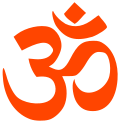
Back فياسا Arabic বেদব্যাস Assamese Viasa AST Вьяса Bashkir Vyasa BCL বেদব্যাস Bengali/Bangla Vyasa Catalan Vyasa CRH Vjása Czech Vyasa German
Maharshi Vyasa | |
|---|---|
 An 1960 illustration of Vyasa reviewing Mahabharata | |
| Title | Maharishi, Vyasadeva, Vedavyasa |
| Personal life | |
| Spouse | Vatikā[1] |
| Children | Shuka (son)
Niyoga
|
| Parent | |
| Known for | |
| Relatives | Maternal Half-Brothers |
| Honours | Guru Purnima |
| Religious life | |
| Religion | Hinduism |
| Institute | Vyasa Peetha |
| Religious career | |
Disciples
| |
| Part of a series on |
| Hinduism |
|---|
 |
Vyasa (/ˈvjɑːsə/; Sanskrit: व्यास, lit. 'compiler, arranger', IAST: Vyāsa) or Veda Vyasa (Sanskrit: वेदव्यास, lit. 'the one who classified the Vedas', IAST: Vedavyāsa), also known as Krishna Dvaipayana Veda Vyasa (Sanskrit: कृष्णद्वैपायन, IAST: Kṛṣṇadvaipāyana Vedavyāsa), is a[2] rishi (sage) with a prominent role in most Hindu traditions. He is traditionally regarded as the author of the epic Mahābhārata, where he also plays a prominent role as a character. He is also regarded by the Hindu traditions to be the compiler of the mantras of the Vedas into four texts, as well as the author of the eighteen Purāṇas and the Brahma Sutras.
Vyasa is regarded by many Hindus as a partial incarnation (Sanskrit: अंशावतार, IAST: Aṃśāvatāra) of Vishnu. He is one of the immortals called the Chiranjivis, held by adherents to still be alive in the current age known as the Kali Yuga.
- ^ Dalal 2019.
- ^ Sullivan 1999, p. 1.
© MMXXIII Rich X Search. We shall prevail. All rights reserved. Rich X Search